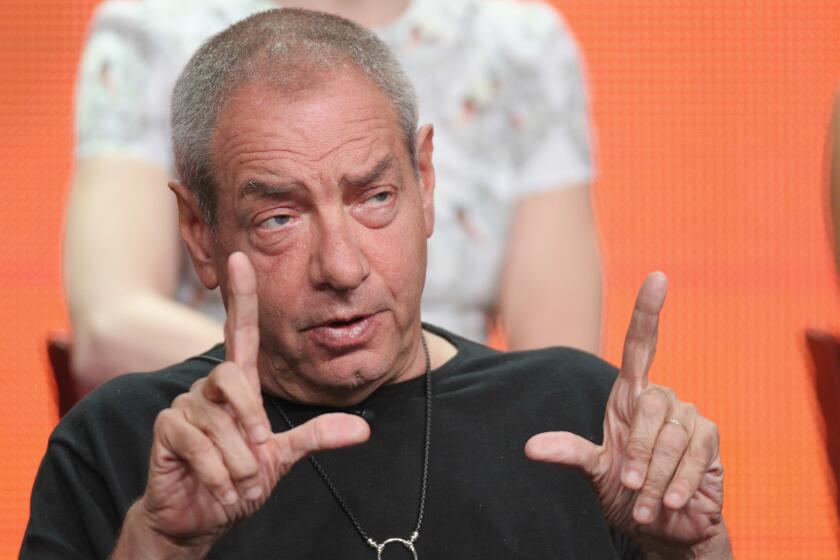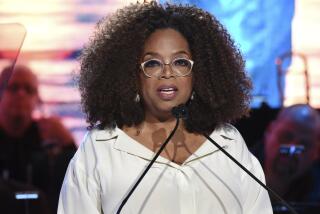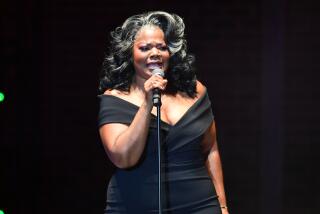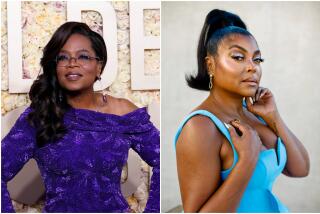Review: Oprah asks ‘Where Do We Go from Here?’ The answers are raw — and necessary
- Share via
Oprah Winfrey isn’t president yet, but more proof that she should occupy the Oval Office arrived during a television special the talk show pioneer launched to address national grief, rage and calls for justice surrounding the police killing of George Floyd.
The two-part special, “Where Do We Go From Here? A Conversation led by Oprah,” is airing on OWN and 18 more Discovery networks on Tuesday and Wednesday nights and features guests that include “When They See Us” director Ava DuVernay and Democratic ray of hope Stacey Abrams.
“We come to you on this day, which represents the final day of George Floyd’s memorial, and just like in our own families, often we can’t begin to process until after the burial or the memorial service,” said Winfrey in her opening statement.
“I’ve been talking on television about racism now for over 35 years,” she explained, saying she’d done more than 100 shows on racism, including those featuring the L.A. riots and Rodney King. “In all those experiences though, I don’t recall a moment quite like this one. Because we find our nation on a precipice ... The same question keeps popping up over and over. Will this be the moment that changes our country?”
Amid the unrest following George Floyd’s death, local TV news channels like KCAL 9, Fox 11, KTLA 5, ABC 7 and NBC 4 are making — and learning from — old mistakes.
What ensued was an hour of refreshing, honest, elevated and personal conversation prompted by Winfrey’s three main questions: “What matters now? What matters next? What do we want?” Winfrey led the exchange with the confidence and expertise of a leader, which was a sight for sore eyes given what we’ve seen out of Washington since COVID-19 pushed us indoors and Black Lives Matter protests got us back out.
She broadcast from what appeared to be her home, in front of a dark fireplace, in an upholstered chair, coffee cup on the table, slippers on her feet, facing a wall of screens where her guests were video-conferenced in.
The hour focused largely on the here and now — their reactions to Floyd’s killing, how we got here and the protests — while Wednesday’s will look at where we go from here. Her guests, whom she introduced as “critical thinkers who match their words with actions,” also included Atlanta Mayor Keisha Lance Bottoms, “Selma” actor David Oyelowo, writer Charles M. Blow, Color of Change President Rashad Robinson and NAACP national board member Rev. William J. Barber II.
“Just like in your own family, the family that is our country, I don’t believe we can move forward without calling out that pain. I want to ask this group about the collective grief and anger,” she said to her panelists.
The first profound analysis came from writer Charles M. Blow, who talked of his reaction to the “callousness” of Floyd’s killing. He also argued police body cameras aren’t the answer to stopping brutality against Black people. Just look at the hubris in Floyd’s case: Officer Derek Chauvin knew he was being filmed and “he doesn’t even move enough to disturb the sunglasses on his forehead,” Blow said. “He did not care the cameras were on him. I don’t believe there’s really necessarily a technological fix to a cultural problem. ... This has always been about power, and the police are the lowest cog in this machine. That’s the one that touches you.”
“Where Do We Go from Here?” is one of several examples of television scrambling its regular programming to show solidarity, or at least appear sympathetic, to the calls for systemic change that have accompanied the protests in the wake of Floyd’s death.
CBS News’ Gayle King anchored “Justice for All,” described as a “prime time special exploring the nationwide fury over racism and brutality in policing in the wake of George Floyd’s death.” BET streamed “BET remembers: George Floyd,” covering his entire funeral service.
This weekend, CNN and “Sesame Street” held a town hall for children and parents titled “Coming Together: Standing Up to Racism” and featuring Big Bird, Van Jones and Erica Hill. Among PBS’ slate of programming is “America in Black and Blue 2020” next Monday.
Other networks with fare that usually leans in favor of law enforcement and often shows Black people as perps tried to replace it with less tone-deaf programming. Tuesday ID aired “The Murder of George Floyd: A Nation Responds,” a panel discussion about police violence, law enforcement reform and activism across the country hosted by ID’s Tony Harris.
Hours earlier, Paramount Network announced it would no longer air “Cops,” which it put on hold earlier this month after Floyd’s death. A&E, which pulled its own “Cops”-on-steroids docuseries “Live PD,” is reportedly evaluating the right time — if there is one — to bring it back.
On Oprah’s special, there was no need to backpedal. Abrams said when she saw “the knee on the neck moment ... that’s what a hunter does on the neck of a deer while waiting for the fight to ebb out. Waiting for the life to ebb out.”
“We have to recognize that while George Floyd’s horrific murder was a catalyst, we are dealing with confluence of events that all demand action,” said Abrams. “The 110,000 people who’ve died from COVID-19 this year, a disproportionate number are Black. When we talk about 40 million people losing their jobs, a disproportionate number are Black. When we talk about healthcare, a disproportionate number [of those without it] are Black.”
Critics say the popular TV shows of “Law & Order,” “Chicago PD” and “FBI” creator Dick Wolf create harmful misperceptions of the criminal justice system.
Oyelowo appeared on the verge of tears when Winfrey asked him what he was feeling: “I have spent so much of the last two weeks crying,” he said. “One of the moments where that began was when I went to speak to my son and I didn’t have the words. Because George Floyd wasn’t resisting arrest. So it’s not like saying to my son, ‘Put your hands on the dash, don’t be confrontational.’ Those conversations are already emasculating. To basically say, ‘Forget about justice in an interaction with police. Just come home alive.’”
DuVernay, her voice hoarse, expressed exhaustion at the energy she and other Black people have had to put toward explaining racism, a 400-year-old problem in America: “Educating Caucasian people ... and hand-holding folks through a process that seems like it never takes hold,” she said. “It’s not a broken system. It was built to function exactly as it is. It feels disingenuous for us as a society to act like we’re suddenly horrified.”
Bottoms held up her “grandmother’s grandparent’s slave records and documents” and said she’s been calling on her ancestors’ strength a lot this week. “How did they get past humiliation and hurt and anger and pain? The only thing I keep coming back to is that they believed there was something better for their children, and their children’s children, and that’s where we are in America. We’ve got to be believe in word and deed that there’s something better.”
When the conversation moved onto protests, DuVernay lamented how demonstrators, looters and rioters were terms used interchangeably on the local news. “Some have said ‘Gosh, they’re losing the message ... because they protest in the day and loot at night ... I really invite people to think about it. If your concern with the murder of Black people by police can be deterred or shifted because someone is taking a pair of jeans from a Target, then you’ve got to look at how much you cared about the murder of Black people by police to begin with.”
More to Read
The complete guide to home viewing
Get Screen Gab for everything about the TV shows and streaming movies everyone’s talking about.
You may occasionally receive promotional content from the Los Angeles Times.








